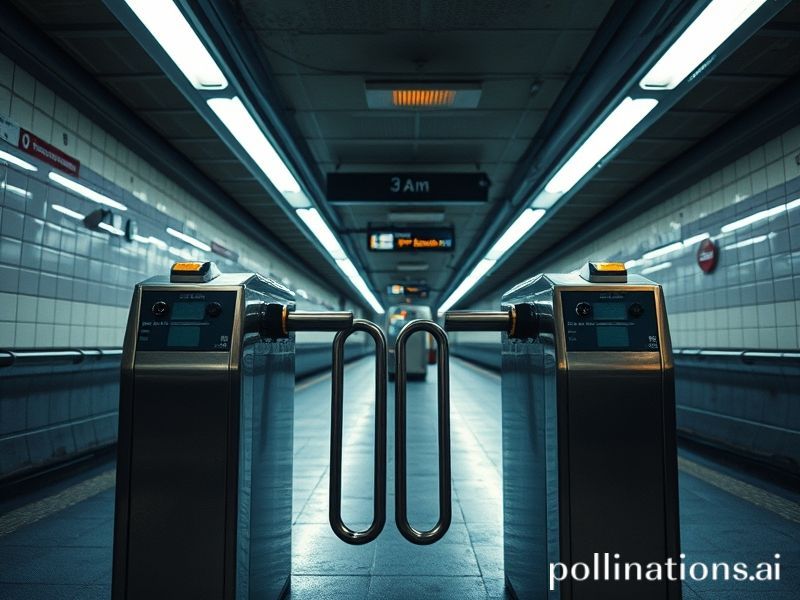Global Turnstiles: The Tiny Metal Gatekeepers of an Anxious Planet
Turnstiles: The World’s Tiniest Border Guards
By the time you finish reading this sentence, roughly 2,700 people will have pushed through a turnstile somewhere on the planet. They will do so in languages that span 180 alphabets, under currencies that may collapse by suppertime, and with pockets containing everything from expired metro cards to emergency cyanide capsules—yet the mechanical click-clack remains eerily universal. The turnstile is the world’s least ambitious but most effective diplomat: it never negotiates, never apologizes, and still gets everyone to queue in neat rows.
From the frostbitten Moscow Metro to the steam-addled Delhi Metro, the turnstile stands as humanity’s polite bouncer. In Tokyo, it bows metaphorically, processing 8.7 million daily commuters with the silent judgment of an overachieving butler. In Lagos, where electricity is more rumor than reality, turnstiles are solar-powered and slightly smug about it. Meanwhile, in London, the Oyster card reader occasionally flashes “Seek Assistance,” a phrase that translates in any language to “Go home and question your life choices.”
Global corporations adore turnstiles because they shrink the messy concept of “people” into tidy metrics. Disney’s MagicBand turnstiles can predict when you’ll buy a churro before you’ve even smelled cinnamon. Amazon’s experimental “Just Walk Out” gates in London track your gait like a jealous ex, ensuring you pay for every overpriced kombucha. The Chinese tech giant Tencent has filed patents for turnstiles that scan your face, your posture, and—why not?—your political loyalty. Nothing says “Welcome” like a machine gauging your trustworthiness in 0.3 seconds.
Of course, not all turnstiles are equal. In the European Union, they’re GDPR-compliant and apologetic; in the Gulf states, they’re plated in chrome and whisper prayers of prosperity as you swipe. In North Korea’s Pyongyang Metro, the turnstile’s primary function is to remind you that you are still in North Korea. Meanwhile, in U.S. cities, turnstiles moonlight as data siphons for police departments that promise they’re only “monitoring threats,” a phrase that in American English covers everything from fare evasion to jazz.
The pandemic briefly made turnstiles objects of international moral panic. Cities wrapped them in plastic like guilty hostages; Paris deployed thermal scanners that beeped if you had a fever, then shrugged Gallically when you walked past anyway. Singapore’s contact-tracing gates chirped cheerful reminders to log your every move, because nothing says “public health” like a government app that knows you bought durian at 3 a.m. The WHO issued guidelines that no one read but everyone cited, and for six surreal months the turnstile became a biohazard bouncer, separating the masked virtuous from the viral underclass.
Refugees know turnstiles better than frequent flyers. At Greece’s Moria camp, a single rusted turnstile separates hope from bureaucracy, ticking slower than a Greek tax refund. In Tijuana, turnstiles mark the U.S. port of entry where dreams are weighed against a quota and usually found wanting. The same machine that lets a London banker tap through with a £3,000 watch will deny a Syrian teacher because her transit visa expired at noon, not 12:07. The turnstile, ever impartial, simply counts: one human, one click, next.
And yet, for all their Orwellian chic, turnstiles are endearingly analog. A well-placed jump or a determined shoulder can defeat most models, reminding us that rebellion is sometimes just a hop away. In São Paulo, teenagers sell “free ride” TikTok tutorials; in Kyiv, pensioners wedge them open with bread loaves—carbohydrate civil disobedience. The machines endure, bent but unbroken, like world-weary bouncers who’ve seen every fake ID on the planet.
Ultimately, the turnstile is the planet’s most honest monument: a rotating metal shrug that says, “Pay up or stay out.” It doesn’t care about your carbon footprint, your crypto portfolio, or your cousin’s revolution. It just counts. And as the climate collapses and borders harden, we may all end up queuing at one last cosmic turnstile—ticket price: one habitable planet. No refunds, no group discounts, exact change appreciated.







